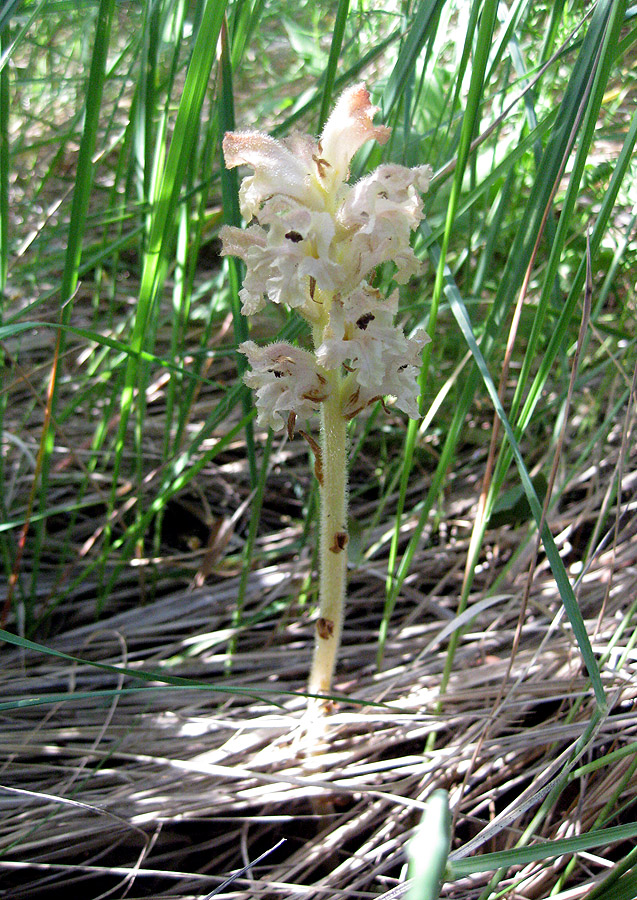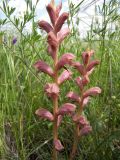
Цветущее растение. Украина, Черкасская обл., Каневский р-н, региональный ландшафтный парк "Трахтемиров", урочище "Монастырок". 26 мая 2012 г.
The marker on the map does not indicate the exact coordinates of the plant or lichen.
The marker does only indicate the conditional center of the terrain ("geographic point") where the photo was taken.
Open mapIdentification history
- 2012-06-05 Vasyl Heluta published it as Orobanche.
- 2012-06-11 Holger Uhlich identified it as Orobanche caryophyllacea.
See also:
Discussion (13)
All photos of taxon (22)
Code of link to photo
| Create: | HTML or BBCode with preview |
| Code for linking on the web: | |
| This is how it will look: |  Orobanche caryophyllacea on the site «Plantarium» |
Text to cite the page
Гелюта В.П. 2012. Изображение Orobanche caryophyllacea Smith // Плантариум. Растения и лишайники России и сопредельных стран: открытый онлайн атлас и определитель растений. [Электронный ресурс] URL: https://www.plantarium.ru/page/image/id/136844.html (дата обращения: 17.04.2025).
Heluta V. 2012. Image of Orobanche caryophyllacea Smith // Plantarium. Plants and lichens of Russia and neighboring countries: open online galleries and plant identification guide. URL: https://www.plantarium.ru/lang/en/page/image/id/136844.html (accessed on 17 Apr 2025).
Views: 2948Discussion
| Holger Uhlich | This plant is Orobanche caryophyllacea. |
| Vasyl Heluta | |
| Andriy Kovalchuk | |
| Holger Uhlich | Dear Andrey,
in Middle Europe is O. caryophyllacea a common plant and - with more than 30 infraspecific taxa - very variable. I have seen many specimen of Orobanche caryophyllacea with bright white, yellowish or darker purple corollas and I'm absolutely convinced that it's O. caryophyllacea. I think, that the hairs or glands seems to be dark on the shining througt corolla. |
| Holger Uhlich | I forgot: The calyx halves of O. caryophyllaceae often very different 2-toothed and the front-tooth of the calyx segment ist smaller and hide under the bract. When the calyx segment seems to be entire, but not in true. |
| Vasyl Heluta | I tried to identify this plant using the key published in our Ukrainian “Определитель высших растений Украины». As a result, I have got Orobanche caesia (lanuginosa) but not O. alba or O. caryophyllaceae. Thus, the place of this plant we have to look in Phelipanche. |
| Andriy Kovalchuk | The plant has definitely nothing to do with members of the genus Phelipanche. Members of this genus have very distinctive corolla shape, and quite often the whole plant is bluish. Vasyly Petrovych, do you have any idea about the probable host plant (at least, would it belong to Rubiaceae, Lamiaceae or Asteraceae)? |
| Vasyl Heluta | It seems me that the host is Galium verum (the second plant photografed with a grasshopper). Around the first plant I remember Poaceae only. |
| Andriy Kovalchuk | If the host plant is indeed Galium verum, it means that Holger is right and it's O. caryophyllacea. Despite its name, this species usually grows on Galium, not on the species of Caryophyllaceae. |
| Vasyl Heluta | Ещё раз прошёлся по ключу. Да, в принципе, выхожу на Orobanche caryophyllacea. Но поверить в то, что снятое мной растение и помещённое на сайте как Orobanche caryophyllacea это одно и то же - сил не хватает. Уж визуально они очень разные. |
| Holger Uhlich | Dear friends,
here is a picture of a similar plant (certainly O. caryophyllacea) from Germany (Nördlinger Ries, mt. Goldberg) http://orowiki.org/wiki/Orobanche_caryophyllacea |
| Vasyl Heluta | Yes, very similar. |
| Vasyl Heluta | Please move this plant to Orobanche caryophyllaceae identified by Холгер Улих. |

